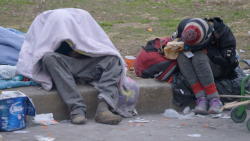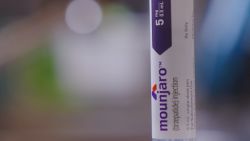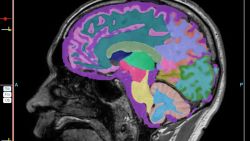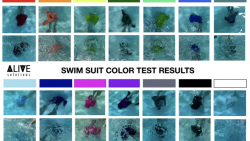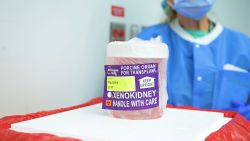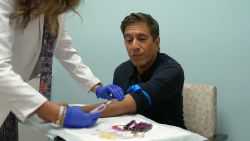What drug users and people who work with them in Philadelphia talk about is the smell. The smell of rotting flesh from open infected wounds.
Some users say they feel ashamed of the state of their bodies, but more feel a sense of urgency. They need help. The wounds are killing them.
“It is absolutely horrible. That’s the reality, though,” said James Sherman, known as Sherm around Philadelphia’s Kensington neighborhood, where he once used drugs and where he now tries to help those still on the streets.??
The need for help has become more urgent over the last three years, as?the animal tranquilizer xylazine, also called tranq, has become a bigger part of Philly’s street fentanyl supply. Xylazine can cause large wounds that won’t heal, no matter where you inject it and they can appear even if you snort it or smoke it. Infections are common and can even lead to amputations.??
“Some people aren’t ready to see that yet,” Sherman said. “It’s literally people’s flesh rotting, and you can smell it.”??

Kensington has seen the changing nature of America’s addiction crisis. It has been well known as a place to buy heroin under the elevated rail line, a short distance but a world away from the business and tourist centers of downtown.??
Heroin was edged out by the more powerful synthetic opioid fentanyl. But fentanyl’s effects don’t last as long as heroin, and so xylazine was added to street fentanyl to “give it legs,” according to Sarah Laurel, who founded Savage Sisters, the harm-reduction group that employs Sherman.?
Xylazine is not approved for humans, but it’s widely available for veterinarians to sedate large animals like horses. Like an opioid, it can kill pain but it cannot be reversed with Narcan, also known as naloxone,?which is used to treat opioid overdoses, according to the US Drug Enforcement Agency. As xylazine is usually mixed in with fentanyl, naloxone can help an overdosed person by counteracting the opioid, though other measures may be needed. Workers at Savage Sisters now carry oxygen tanks with them.
The drug has side effects like “tranq walk,” where people seem unaware of their surroundings, along with sores and wounds.??
A user, Maggie, told CNN what she’s seen. “You shoot up and you miss, you get a sore. You don’t take care of your sore, you’ll wind up in a hospital with a hole,” she said. It had happened to her. It started out like a pimple, and then it got bigger, and then the skin came off and she had a half-dollar-sized wound. “I could have lost my hand.”?

Tranq made its mark on Philadelphia’s street drugs about three years ago. That’s when doctors, users and those who try to help them saw a difference.?
Dr. Joseph D’Orazio, an emergency physician and addiction medicine specialist at Temple University Hospital, said patients started to have major wounds that were different from typical injection drug use. “These wounds were a lot deeper, a lot more severe, there were big necrotic areas,” he said. “They were deep down into tendons. Sometimes you can see the bones, and we were starting to see more patients that were requiring amputations.”??
Initially, there was no demand for xylazine.??
“Nobody was coming to Kensington to buy tranq, they were coming to get heroin,” said Laurel of the Savage Sisters group. “You don’t go to your drug dealer and say, ‘Do you have a nutrition label with this?’ … You get what you get, and you don’t get upset.” And whatever you get, you eventually feel a physical compulsion to do, she said.?
D’Orazio, who also runs a streetside clinic in Kensington, said: “I’ve heard some people say, ‘Everything has fentanyl in it except the fentanyl.’” That’s the way fentanyl has been found as an adulterant in many other drugs, helping to drive US overdose deaths to record highs. But in Kensington, now the fentanyl supply has adulterants too. Xylazine is in? 9 out of 10 samples of lab-tested dope?in Philadelphia. “What we’re seeing is the bags of fentanyl sometimes don’t have fentanyl … it’s just xylazine,” he said. ??
Xylazine is most concentrated in Philadelphia, according to Dr. Rahul Gupta, director of the Office of National Drug Control Policy. But it’s in all 50 states, he told CNN.??
The White House is looking at xylazine as a potential “emerging threat,” which would trigger the development of a federal plan to address it, he said.??
And last week the US Food and Drug Administration?announced it had taken action to stop unlawful imports?of xylazine.??
That might slow the spread of xylazine, first noted in Puerto Rico in the 2000s, across the nation. But in Kensington, there could be more unintended consequences. ??
Xylazine withdrawal can cause intense anxiety and dysphoria, D’Orazio said, and the medications used to treat opioid withdrawal don’t work well for xylazine. That’s making the public health crisis worse. “People are avoiding the hospital because they feel like withdrawal can’t be well managed,” he said. “They go longer, and the disease gets worse before they come in.”??

Dana, who came to Savage Sisters to get her wounds treated, said she was violently ill when in withdrawal from xylazine. “I’d rather come off fentanyl and heroin put together than xylazine,” she said.??
There is also a fear that something even worse could replace the currently cheap and widespread xylazine if it becomes harder to get.??
Neither D’Orazio nor Laurel think cutting supply will do much for people who are addicted and without homes in Kensington.
D’Orazio said there needed to be more affordable housing, more access to health care, fewer restrictions on drugs that treat addiction, and less stigma on what he?says is a chronic disease, like diabetes. But he added there also needs to be more focus on prevention of drug use disorder, which means looking at mental health care. His patients tended to have suffered childhood trauma, like abuse and neglect. There needs to be more “early intervention for people with trauma in their life,” he said.??
Maurice, whose voice has been?hoarse since he was injected in the neck with tranq and fentanyl a couple of months ago, said: “A lot of people have pain from their past they’re dealing with, and they try to numb themselves.”??
In conversations with CNN about why they’d come to Savage Sisters, several people brought up painful past experiences like rape or abuse almost immediately, as though those memories were simmering just below the surface. Maggie said that, at 66, “It’s been a long life, believe me, doing this sh*t … things I’ve got to face. I’ve got to get some kind of therapy. This thing happened to me when I was five years old that shouldn’t have happened to me.”
Laurel, herself a recovering heroin addict, calls everyone she meets and tries to help in Kensington her “friend.”?
“The people that are out here numbing their pain with substances, whether it’s heroin, alcohol, cocaine, we need to address the pain, we need to stop isolating the substance and look beyond it,” she said. ??
Savage Sisters offers several mental health programs for people in its recovery houses, and Laurel says it’s very expensive, but worth it. She’s had to work hard to raise money. “Until it directly affects them, nobody cares. It’s ugly. It’s not a cute, fun thing to donate your money or time to, right? It’s hard. It’s rough. It’s sad. It’s painful. … I had to come up with ways to convince people that we’re worth saving.”??
Some news organizations have called xylazine “the zombie drug.” Laurel hates that term. “The only way that you can get rid of a zombie is by killing their brain,” she said. “Why would you say that about my friends? Why would you say that about a human? It’s already hard enough trying to get people to care about us.”?

